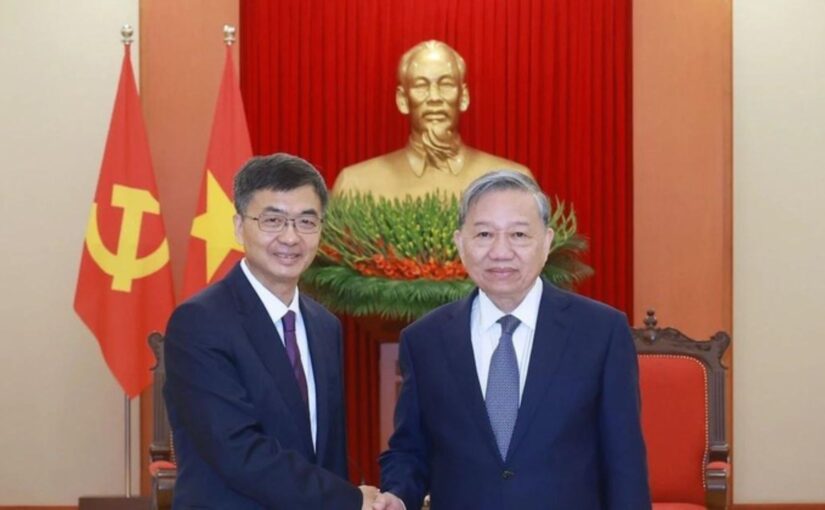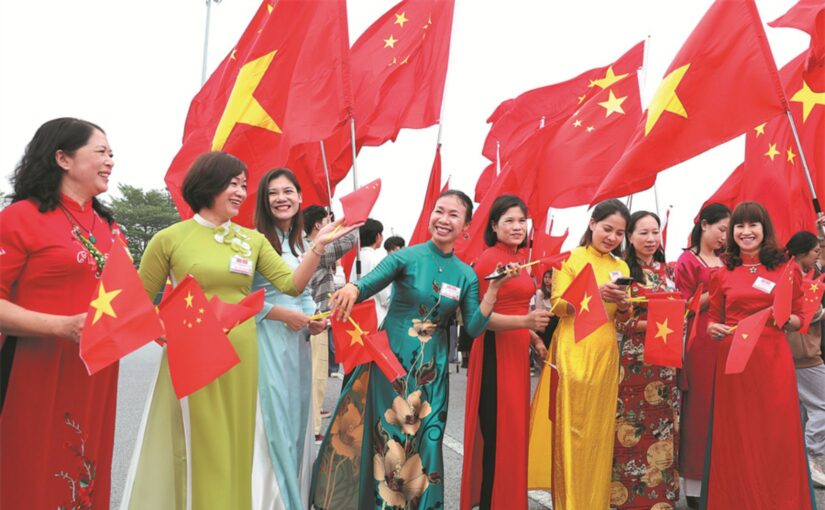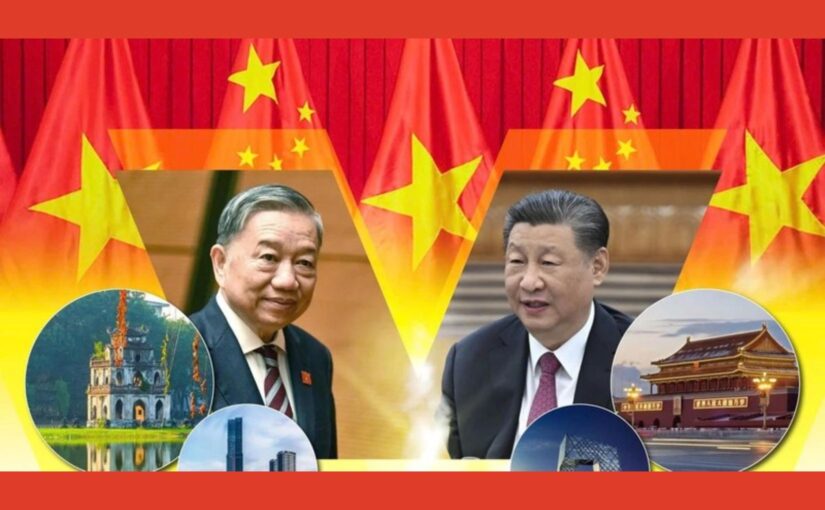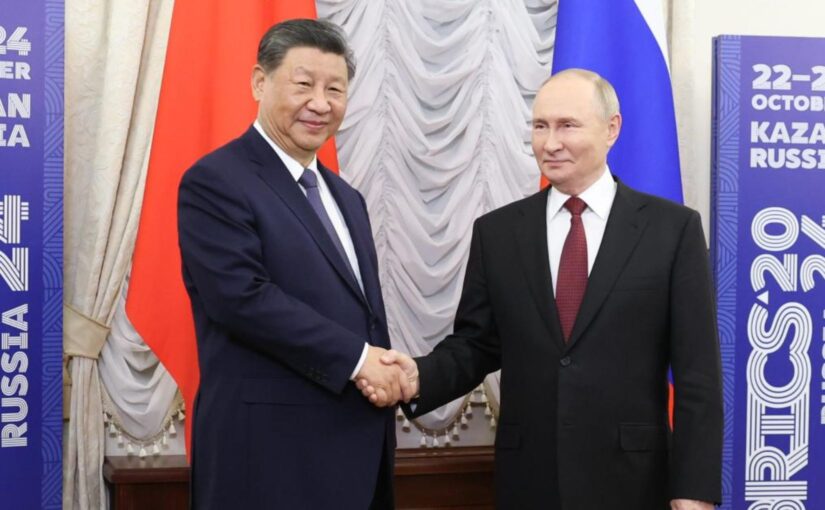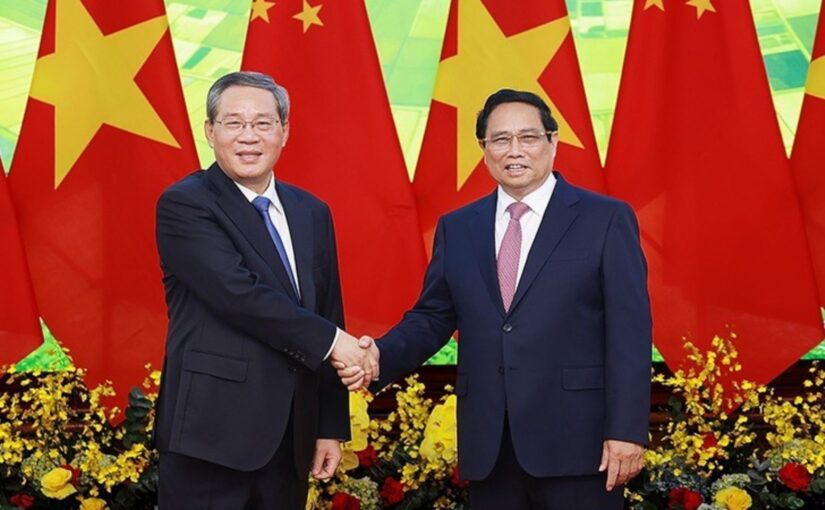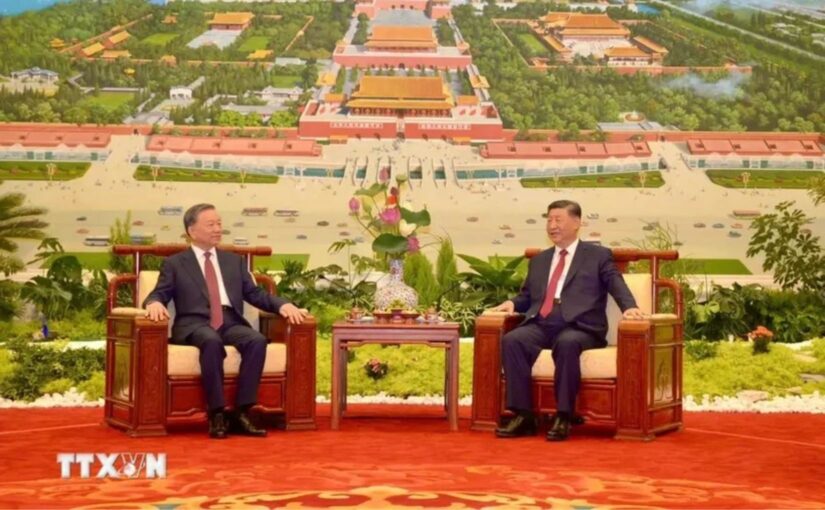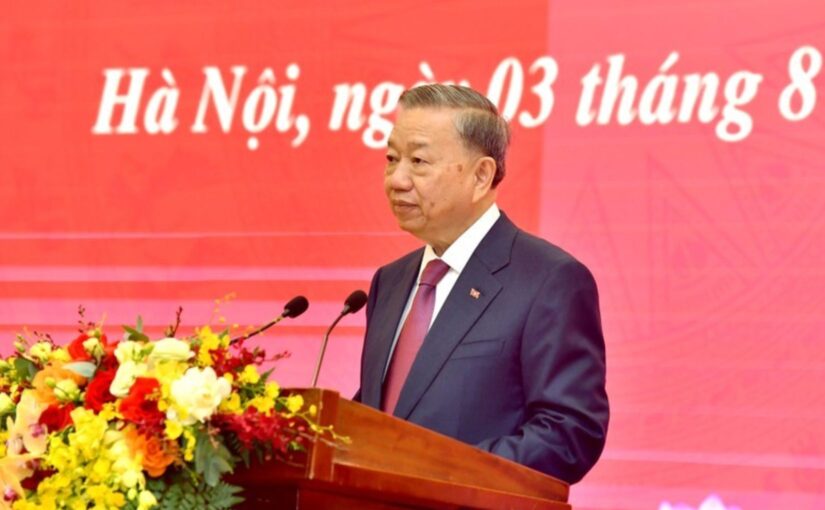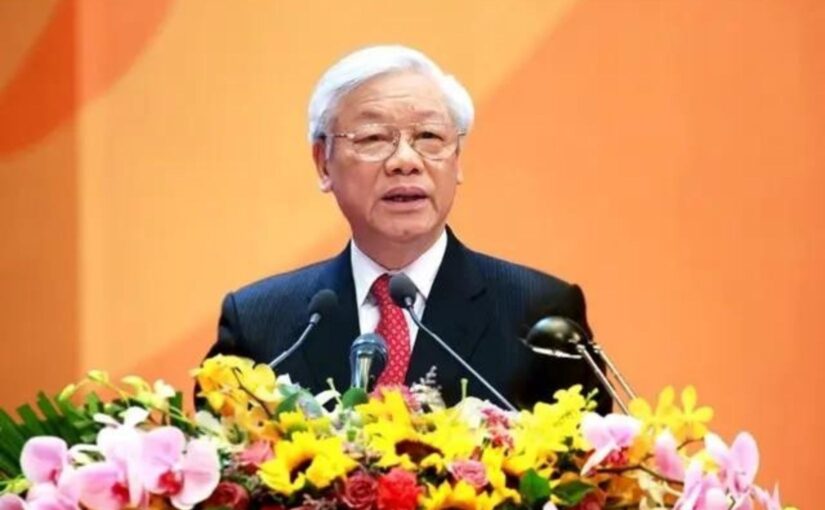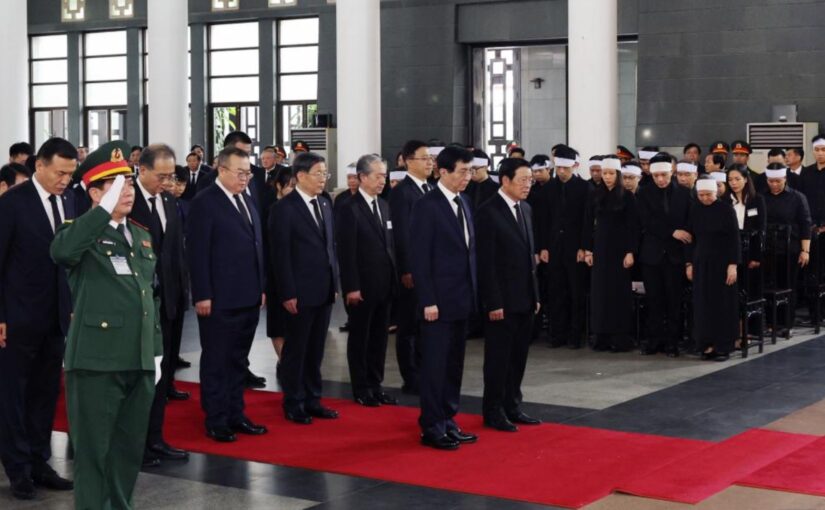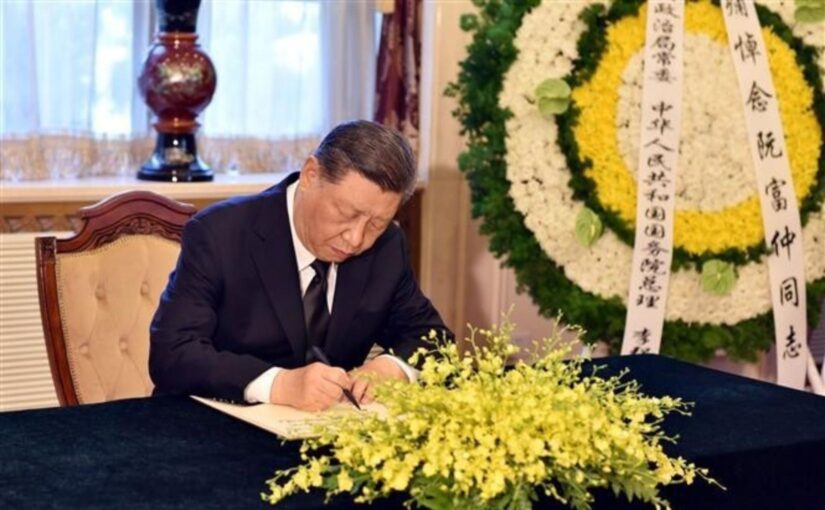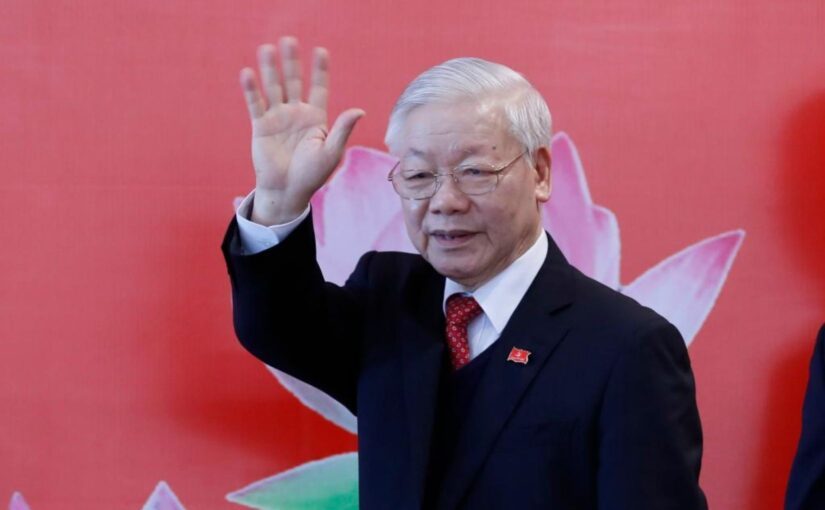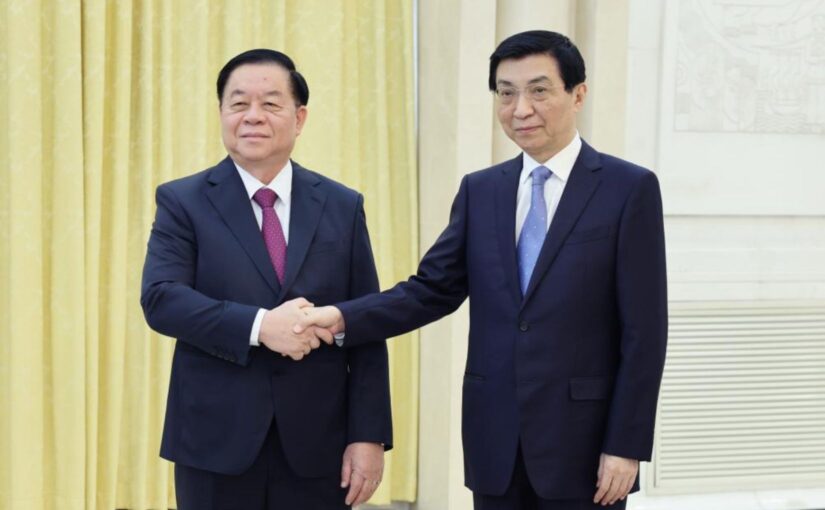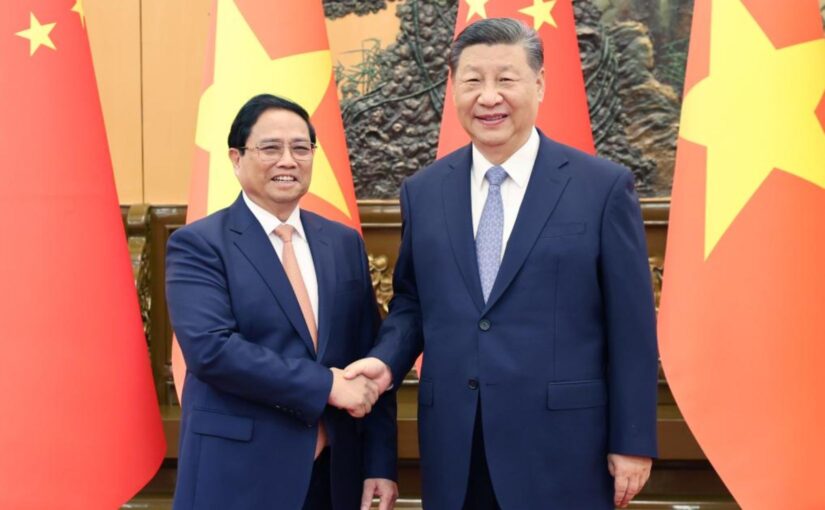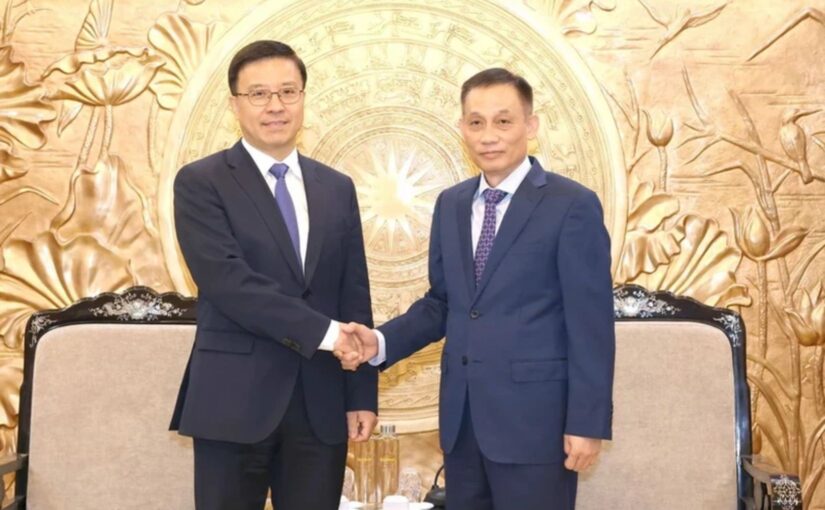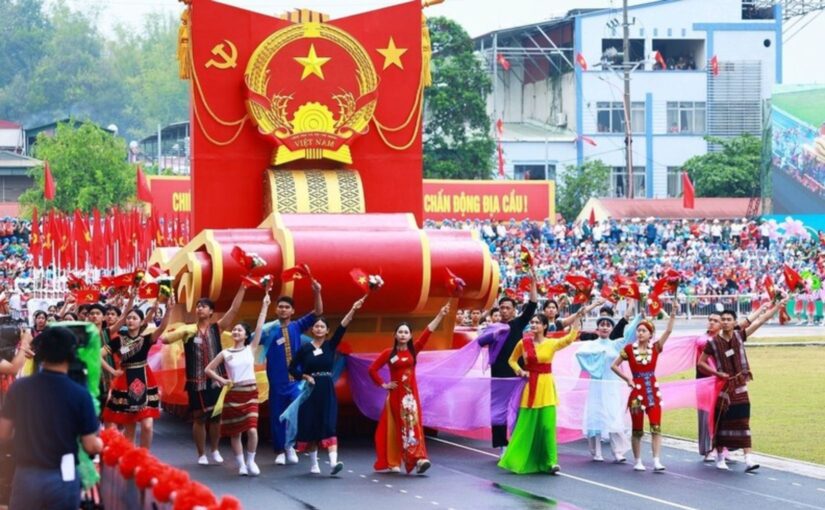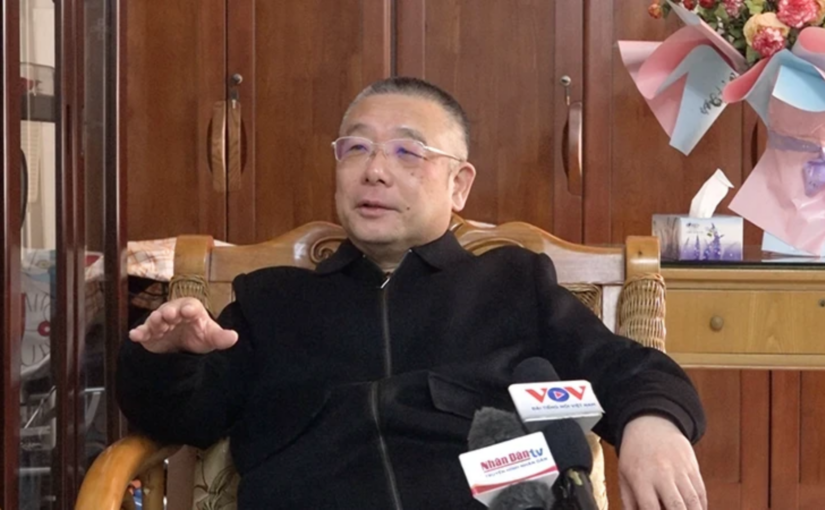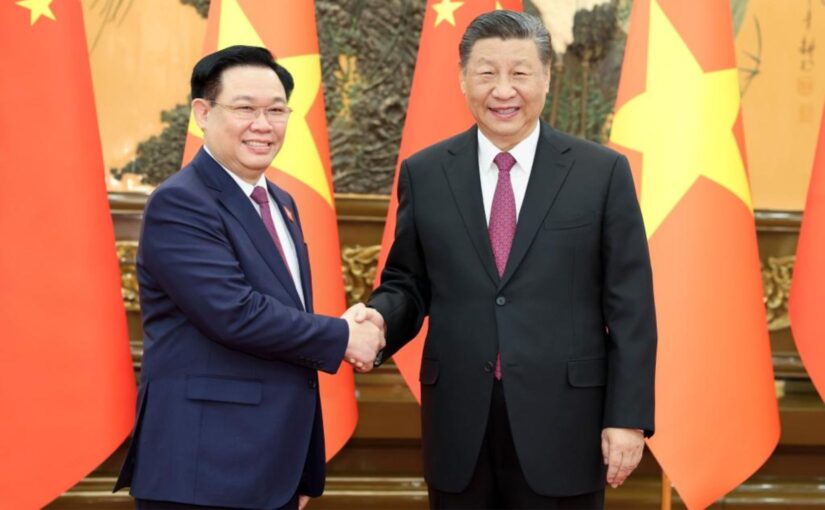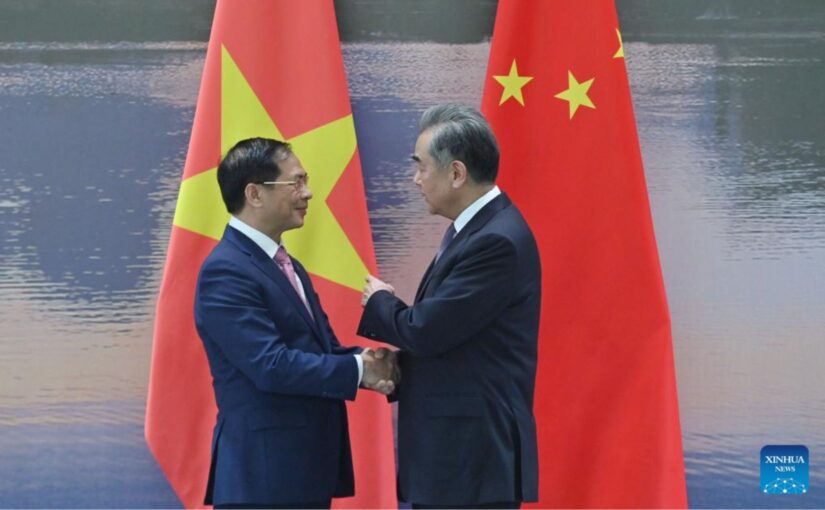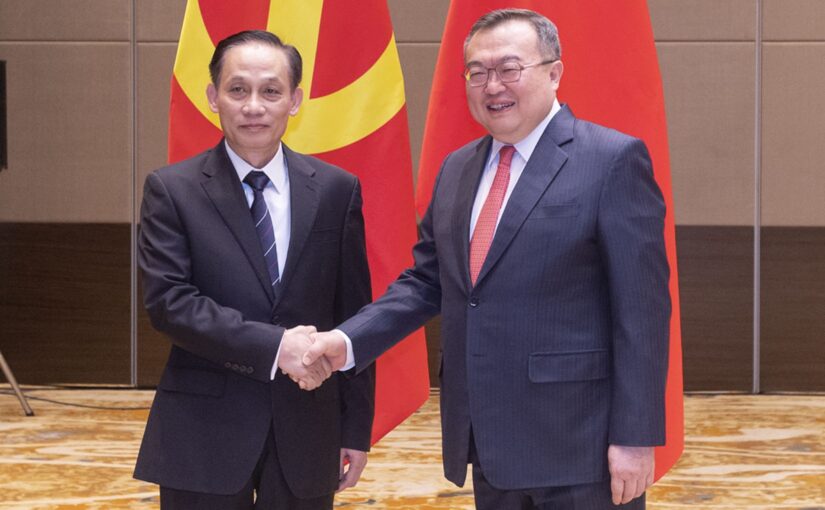Friendly relations between the two socialist neighbours of China and Vietnam have got off to a flying start in 2025 with a focus on the 75th anniversary of their diplomatic relations. On January 18, 1950, just some three months after its own foundation, the People’s Republic of China became the very first country to establish diplomatic relations with the Democratic Republic of Vietnam (now the Socialist Republic of Vietnam), which had been founded by Ho Chi Minh on September 2, 1945.
Chinese President Xi Jinping, who is also the General Secretary of the Communist Party of China (CPC) Central Committee, exchanged congratulatory messages with General Secretary of the Communist Party of Vietnam (CPV) Central Committee To Lam and Vietnamese President Luong Cuong on the anniversary day.
Xi said that China and Vietnam, two friendly socialist neighbours, represent a community with a shared future that carries strategic significance. Since the establishment of diplomatic ties 75 years ago, the two sides have fought side by side and supported each other in their struggle for national independence and liberation, Xi said, adding that “So profound is the friendship between Vietnam and China, because we are both comrades and brothers” has become the most vivid portrayal of the relations between the two parties and countries.
In advancing socialism, the two sides have learned from each other and forged ahead hand in hand, thereby deepening their comprehensive strategic cooperation, he said, adding that China and Vietnam share the same ideals and pursue a shared future, which is the most striking feature of the relations between the two parties and countries.
As changes of the world, of the times and of history are unfolding in unprecedented ways, China and Vietnam continuing to follow in good faith the path of socialism has a bearing on the future of the two parties and countries as well as the future of the global socialist cause, and is of great significance to the peace, stability, development and prosperity of the region and the world at large.
Xi added that he attaches great importance to the growth of bilateral relations and is willing to work with Vietnamese leaders to take the opportunity of the 75th anniversary of diplomatic ties and the China-Vietnam Year of People-to-People Exchanges, keep in mind the original mission and forge ahead on the new journey toward socialist modernisation, so as to deliver more benefits to the two peoples and make important contributions to revitalising the world socialist cause as well as pushing for human development and progress.
For his part, To Lam said that over the past 75 years, the two parties and countries have gone hand in hand and have forged a deep traditional friendship described as “So profound is the friendship between Vietnam and China, because we are both comrades and brothers.” [The significance of both leaders employing this same phrase is that it is a line of poetry from Ho Chi Minh.]
Against the backdrop of profound and complex changes in the international and regional situation, with the socialist cause of the two countries entering a critical stage, top leaders of the two parties and countries have agreed to build a Vietnam-China community with a shared future that carries strategic significance, noted To Lam.
Luong Cuong said that experiences over the last 75 years have proved that the consolidation of bilateral traditional friendship is in line with the fundamental aspirations and long-term interests of the two peoples, and will contribute to regional and world peace, stability, cooperation and development.
He expressed the belief that under the strong leadership of the CPC Central Committee with Comrade Xi Jinping at its core and under the guidance of Xi Jinping Thought on Socialism with Chinese Characteristics for a New Era, China will achieve the goals and tasks set forth at the 20th CPC National Congress and build China into a great modern socialist country that is prosperous, strong, democratic, culturally advanced, harmonious and beautiful.
Other Chinese leaders also exchanged messages with their Vietnamese counterparts for the anniversary.
Earlier, Xi Jinping and To Lam had held a phone call on January 15.
The year 2025 marks the conclusion of China’s 14th Five-Year Plan period, and a key year for the preparation of the 14th National Congress of the CPV, Xi said, noting it is a year of great significance for both countries that serves as both a point of continuity and a new starting point. The two sides should continue to rejuvenate and strengthen the two parties, deepen exchanges of socialist theory and practical experience, and promote the development of the socialist cause amid great changes unseen in a century.
He added that the two sides should carry out warm and down to earth people-to-people and cultural exchanges that connect people’s hearts, and strengthen exchanges and cooperation in areas such as media, culture and tourism, as well as between the youths of the two nations and at the sub-national level, creating more projects that win the hearts of the people.
Xi pointed out that since the 13th National Congress of the CPV, the party has united and led all the Vietnamese people to overcome various difficulties and challenges and make new achievements in the cause of socialist construction and renovation.
To Lam said that with the goal of preparing for the 14th National Congress of the CPV, Vietnam is set to embark on a new era of development, which envisions a prosperous, powerful, democratic, equitable, and civilised nation. In this process, Vietnam will learn from China’s development experience as much as possible, especially the new theoretical and practical innovation of Xi Jinping Thought on Socialism with Chinese Characteristics for a New Era.
He added that Vietnam will continue to give top priority to developing Vietnam-China relations in its foreign policy, strengthen strategic communication between the two parties and two countries, enhance policy alignment with China, jointly host the celebration of the 75th anniversary of the establishment of diplomatic ties, properly manage and resolve differences, and push forward the building of a Vietnam-China community with a shared future of strategic significance.
Vietnamese Permanent Deputy Foreign Minister Nguyen Minh Vu gave a media briefing on the occasion.
He said that since the beginning of 2024, the two nations’ key leaders have held over 20 meetings during bilateral visits and on the sidelines of multilateral events. Mechanisms for bilateral exchange and cooperation have become increasingly comprehensive and diverse, reflecting a high level of mutual trust.
At the same time, trade, investment, and tourism cooperation have seen positive growth. In the first 11 months of 2024, bilateral trade reached 185.6 billion USD, an 18.9% increase. Notably, Vietnam’s key agricultural exports saw substantial gains, with durian exports to China exceeding USD 3.5 billion, a 50% rise compared to the previous year. Chinese tourist arrivals to Vietnam surpassed 3.3 million, a remarkable 222% increase.
Celebrations of the anniversary were held in both the Vietnamese capital Hanoi and in the country’s economic powerhouse Ho Chi Minh City.
CPV Politburo member, President of the Ho Chi Minh National Academy of Politics (HCMA) and Chairman of the Central Theory Council Nguyen Xuan Thang attended a banquet hosted by the Chinese Embassy in Vietnam on January 17.
Addressing the event, Thang reflected on the history of Vietnam-China relations, acknowledging periods of ups and downs but emphasising that solidarity, friendship, and cooperation have remained the primary trajectory.
He expressed his confidence that under the leadership of the two countries’ leaders, along with efforts of ministries, sectors, localities and people, the comprehensive strategic cooperative partnership between the two nations and the Vietnam-China community with a shared future that carries strategic significance will thrive in a deep, stable and sustainable manner for the happiness of both countries’ people as well as for peace and progress of humankind.
For his part, Chinese Ambassador to Vietnam He Wei praised the historic achievements of the Vietnam-China relationship over the past 75 years. He highlighted the enduring friendship of being both comrades and brothers initiated by Chairman Mao Zedong and President Ho Chi Minh as the firm political foundation for the two countries’ strong ties.
At the Ho Chi Minh City event, held on January 20, Permanent Vice Chairman of the Ho Chi Minh City People’s Committee Duong Ngoc Hai reflected on the long-standing relationship between the two countries.
He emphasised that over the past 75 years, the governments and people of Vietnam and China have deeply valued the importance of nurturing and strengthening their traditional friendship. This relationship, initiated and cultivated by President Ho Chi Minh and Chairman Mao Zedong, has laid a strong foundation for the continuous development of the bilateral relations.
The Chinese Ambassador, reflecting on the 75-year history, acknowledged that despite challenges, the relations between Vietnam and China have flourished and reaped positive outcomes in multiple sectors, including politics, defence, trade, tourism, and people-to-people exchanges. He expressed optimism that Ho Chi Minh City, as Vietnam’s economic engine and a pioneer in the country’s reforms, will benefit from the positive development of Vietnam-China relations.
In an interview with the Vietnam News Agency, Vietnamese Ambassador to China Pham Thanh Binh said that over the 75-year journey, the bilateral relationship has experienced ups and downs, but the two Parties, governments, and peoples have stood shoulder to shoulder, offering immense and invaluable support to one another, contributing to the success of national liberation and construction and the development of each country. The friendship of being both comrades and brothers, built and nurtured by President Ho Chi Minh and Chairman Mao Zedong, along with generations of the two countries’ leaders, has become a valuable asset of both nations.
Especially since the normalisation of relations in 1991, the relationship between the two Parties and two countries has been continuously promoted to new heights, registering important achievements and milestones.
In politics, the leaders of the party, state, government, parliament and united front of the two countries regularly meet to promote traditional friendship, strengthen political trust and deepen cooperation across various fields while well controlling disagreements, orienting and promoting the healthy and long-term stable development of Vietnam-China relations.
The economic and trade ties between Vietnam and China have seen robust development. China remains Vietnam’s largest trading partner, its top import market, and its second-largest export market. In 2024, the first year of the two countries implementing agreements and common perceptions after the upgrade of bilateral ties, bilateral trade surpassed 200 billion USD. Vietnam is currently China’s fourth-largest trading partner globally.
Since the normalisation of relations in 1991, bilateral trade has increased more than 6,400 times, from 32 million USD to 200 billion USD. In terms of investment, China has become Vietnam’s third-largest foreign investor, with total registered capital amounting to 31.8 billion USD. This figure marks significant growth from 2014, when China ranked ninth, with cumulative registered capital of about 8 billion USD.
The two countries have resolved two of their three border and territorial issues with the signing of the Land Border Agreement in 1999 and completing the land border demarcation work in 2008, and signing the agreement on the demarcation of the Gulf of Tonkin in 2000. Regarding maritime disputes, senior leaders of the two Parties and countries have reached significant common perceptions on well managing disagreements and maintaining peace and stability at sea.
The following articles were originally published by the Xinhua News Agency and Nhân Dân.
Xi says ready to push for building China-Vietnam community with a shared future
BEIJING, Jan. 18 (Xinhua) — Chinese President Xi Jinping said on Saturday that he is ready to work with Vietnamese leaders to deepen strategic mutual trust, strengthen practical cooperation, and push for new achievements in building a China-Vietnam community with a shared future that carries strategic significance.
Xi, also general secretary of the Communist Party of China (CPC) Central Committee, made the remarks when exchanging congratulations with General Secretary of the Communist Party of Vietnam Central Committee To Lam and Vietnamese President Luong Cuong over the 75th anniversary of diplomatic ties.
Xi said that China and Vietnam, two friendly socialist neighbors, represent a community with a shared future that carries strategic significance.
Since the establishment of diplomatic ties 75 years ago, the two sides have fought side by side and supported each other in their struggle for national independence and liberation, Xi said, adding that “So profound is the friendship between Vietnam and China, because we are both comrades and brothers” has become the most vivid portrayal of the relations between the two parties and countries.
In advancing socialism, the two sides have learned from each other and forged ahead hand in hand, thereby deepening their comprehensive strategic cooperation, he said, adding that China and Vietnam share the same ideals and pursue a shared future, which is the most striking feature of the relations between the two parties and countries.
Recalling his successful visit to Vietnam in 2023, Xi said that the two sides pledged to work for a China-Vietnam community with a shared future that carries strategic significance, raising up the relations between the two parties and countries to a new stage.
As changes of the world, of the times and of history are unfolding in unprecedented ways, Xi said, China and Vietnam continuing to follow in good faith the path of socialism has a bearing on the future of the two parties and countries as well as the future of the global socialist cause, and is of great significance to the peace, stability, development and prosperity of the region and the world at large.
Xi said that he attaches great importance to the growth of bilateral relations and is willing to work with Vietnamese leaders to take the opportunity of the 75th anniversary of diplomatic ties and the China-Vietnam Year of People-to-People Exchanges, keep in mind the original mission and forge ahead on the new journey toward socialist modernization, so as to deliver more benefits to the two peoples and make important contributions to revitalizing the world socialist cause as well as pushing for human development and progress.
For his part, To Lam said that over the past 75 years, the two parties and countries have gone hand in hand and have forged a deep traditional friendship described as “So profound is the friendship between Vietnam and China, because we are both comrades and brothers.”
He noted that the Vietnamese party, government and people have always taken developing good relations with China as a consistent stand and top priority in Vietnam’s foreign policy.
Against the backdrop of profound and complex changes in the international and regional situation, with the socialist cause of the two countries entering a critical stage, top leaders of the two parties and countries have agreed to build a Vietnam-China community with a shared future that carries strategic significance, noted To Lam.
He expressed his firm belief that under the personal attention and guidance of leaders of the two parties and countries, various departments of the two sides will work closely together to push the building of a Vietnam-China community with a shared future to a new level.
Luong Cuong said that experiences over the last 75 years have proved that the consolidation of bilateral traditional friendship is in line with the fundamental aspirations and long-term interests of the two peoples, and will contribute to regional and world peace, stability, cooperation and development.
Vietnam is willing to work with China to continuously deepen their comprehensive strategic cooperation and promote the building of a Vietnam-China community with a shared future that carries strategic significance, he said.
He expressed the belief that under the strong leadership of the CPC Central Committee with Comrade Xi Jinping at its core and under the guidance of Xi Jinping Thought on Socialism with Chinese Characteristics for a New Era, China will achieve the goals and tasks set forth at the 20th CPC National Congress and build China into a great modern socialist country that is prosperous, strong, democratic, culturally advanced, harmonious and beautiful.
On the same day, Chinese Premier Li Qiang exchanged congratulatory messages with Vietnamese Prime Minister Pham Minh Chinh.
Li said that he is willing to work with Pham Minh Chinh to earnestly implement the important consensus reached by the top leaders of the two parties and countries, and push the development of bilateral relations and bilateral cooperation in various fields to a new level.
Pham Minh Chinh pledged Vietnam’s readiness to work with China to strengthen supervision and guidance to various departments and localities, so as to speed up the implementation of important cooperation plans and promote the implementation of the consensus on six major goals reached by leaders of the two parties and countries.
Vietnam, China exchange congratulatory messages on 75th anniversary of diplomatic ties
Jan. 18 (Nhân Dân) — Top Vietnamese and Chinese leaders have exchanged their messages of congratulations on the occasion of the 75th anniversary of diplomatic relations between the two countries (January 18, 1950 – 2025).
General Secretary of the Communist Party of Vietnam Central Committee To Lam, State President Luong Cuong, Prime Minister Pham Minh Chinh, Chairman of the National Assembly Tran Thanh Man, President of the Vietnam Fatherland Front Central Committee Do Van Chien exchanged congratulatory messages with General Secretary of the Communist Party of China Central Committee and President of China Xi Jinping, Premier Li Qiang, Chairman of the Standing Committee of the National People’s Congress of China Zhao Leji and Chairman of the Chinese People’s Political Consultative Conference National Committee Wang Huning.
In their messages, the Vietnamese leaders highlighted that over the past 75 years, the traditional friendship between Vietnam and China has maintained stable development. Political trust has been increasingly consolidated, the bonds of friendship between both nations’ people have been stronger, and cooperation in various fields has deepened and become more substantive, bringing tangible benefits to the two countries’ people, contributing to peace, stability, and prosperity in the region and the world.
The Party, State, and people of Vietnam value and remember the invaluable and effective cooperation and support given by the Party, State, and people of China in historical periods. Developing the traditional friendship and comprehensive cooperation with China remains a consistent policy and a top priority in Vietnam’s foreign policy of independence, self-reliance, and diversification and multilateralisation of relations.
In the context of profound changes in the global and regional landscape, and as the socialist cause in each country enters a pivotal stage, the top leaders of the two Parties and nations have agreed to further strengthen the comprehensive strategic cooperative partnership, promote the building of the Vietnam-China community with a shared future that carries strategic significance, for the happiness of the people of both countries and for peace and progress for humanity. This is both a responsibility and an objective necessity, aligning with the aspirations and interests of the two Parties and peoples.
Meanwhile, the congratulatory messages from Chinese leaders said that China and Vietnam, two friendly socialist neighbours, represents a community with a shared future that carries strategic significance.
Since the establishment of diplomatic ties 75 years ago, the two sides have fought side by side and supported each other in their struggle for national independence and liberation. The Vietnam-China friendship of being both comrades and brothers has become the most vivid symbol of the relations between the two parties and countries.
In advancing socialism, the two sides have learned from each other and forged ahead hand in hand, thereby deepening their comprehensive strategic cooperation.
On this occasion, Secretary of the Party Central Committee and Head of the its Commission for External Relations Le Hoai Trung and Deputy Prime Minister and Minister of Foreign Affairs Bui Thanh Son exchanged congratulatory messages with Head of the International Department of the Communist Party of China Central Committee Liu Jianchao and Director of the Office of the Central Commission for Foreign Affairs and Minister of Foreign Affairs Wang Yi.
Xi urges China, Vietnam to step up connectivity, new quality productive forces cooperation
BEIJING, Jan. 15 (Xinhua) — Chinese President Xi Jinping on Wednesday called on China and Vietnam to step up connectivity, jointly build frontier platform for new quality productive forces cooperation, and build stable and smooth cross-border industrial and supply chains.
Xi, also general secretary of the Communist Party of China (CPC) Central Committee, made the remarks during his phone talks with General Secretary of the Communist Party of Vietnam (CPV) Central Committee To Lam.
Xi said he is glad to hold phone talks with To Lam at the turn of the year and on the occasion of the 75th anniversary of the establishment of bilateral diplomatic ties, recalling that during To Lam’s state visit to China last August, the two leaders had in-depth exchanges and reached broad consensus on deepening relations between the two parties and the two countries, as well as jointly promoting the development of socialist cause.
Over the past six months, the two sides have been active in implementation of the consensus, and the cooperation issues the two leaders agreed on have achieved positive progress, Xi said.
The year 2025 marks the conclusion of China’s 14th Five-Year Plan period, and a key year for the preparation of 14th National Congress of the CPV, Xi said, noting it is a year of great significance for both countries that serves as both a point of continuity and a new starting point.
The two sides should continue to rejuvenate and strengthen the two parties, deepen exchanges of socialist theory and practical experience, and promote the development of the socialist cause amid great changes unseen in a century, said Xi.
It is necessary to fully leverage the political guidance of high-level exchanges and continue to maintain close exchanges, Xi said, adding the two countries should push for more results in mutually beneficial cooperation.
The two sides should carry out warm and down to earth people-to-people and cultural exchanges that connect people’s hearts, and strengthen exchanges and cooperation in areas such as media, culture and tourism, as well as between the youths of the two nations and at the sub-national level, creating more projects that win the hearts of the people, Xi said.
The two countries should also strengthen international and regional coordination, safeguard international fairness and justice, and jointly build a community with a shared future for mankind, he added.
Xi pointed out that since the 13th National Congress of the CPV, the CPV has united and led all the Vietnamese people to overcome various difficulties and challenges and make new achievements in the cause of socialist construction and renovation.
It is believed that under the leadership of the Central Committee of the CPV headed by Comrade To Lam, the party, the state and the people of Vietnam will focus on ensuring the 14th National Congress a success, and firmly advance toward Vietnam’s two centennial goals, Xi said.
For his part, To Lam first extended sincere condolences over the heavy loss of life and property caused by the earthquake in China’s Xizang Autonomous Region, expressing confidence that under the leadership of the CPC Central Committee with Xi at its core, China will overcome the damage caused by the earthquake at an early date.
The Vietnamese side sincerely admires the tremendous development achievements made by the Chinese people under the leadership of the CPC, and believes that China will leverage its advantages in economic scale and development of new quality productive forces and continue to make greater achievements in development, To Lam said.
He added that Vietnam actively supports the three major global initiatives proposed by Xi and is willing to strengthen cooperation with China within this framework.
To Lam noted that over the past year, Vietnam has united the whole party and nation to overcome many difficulties and challenges, achieving significant new results in economic and social development.
To Lam said that with the goal of preparing for the 14th National Congress of the CPV, Vietnam is set to embark on a new era of development, which envisions a prosperous, powerful, democratic, equitable, and civilized nation.
In this process, Vietnam will learn from China’s development experience as much as possible, especially the new theoretical and practical innovation of Xi Jinping Thought on Socialism with Chinese Characteristics for a New Era, he added.
To Lam said that Vietnam will continue to give top priority to developing Vietnam-China relations in its foreign policy, strengthen strategic communication between the two parties and two countries, enhance policy alignment with China, jointly host the celebration of the 75th anniversary of the establishment of diplomatic ties, properly manage and resolve differences, and push forward the building of a Vietnam-China community with a shared future of strategic significance.
Xi and To Lam jointly announced the official launch of the China-Vietnam Year of People-to-People Exchanges, and exchanged New Year greetings, wishing the two peoples good luck and well-being.
Vietnam, China prioritise strengthening bilateral ties
Jan. 15 (Nhân Dân) — General Secretary of the Communist Party of Vietnam (CPV) Central Committee To Lam and General Secretary of the Communist Party of China (CPC) Central Committee and President of China Xi Jinping talked over the phone on January 15, during which both leaders affirmed commitments to prioritising the enhancement of relations between the two countries.
The talks took place on the occasion of the 75th founding anniversary of Vietnam-China diplomatic relations (January 18, 1950 – 2025), and in the context that the two nations are preparing for the Lunar New Year Festival.
The two leaders noted the significance of the phone talks, viewing it as an important and positive start for the Year of Vietnam-China Humanistic Exchange. They said it reflects the high regard and top priority each side places on the relations between the two Parties and countries, setting the direction for their effective cooperation in 2025 and the years to come.
As the Year of the Snake is approaching, the two leaders wished for greater achievements in the socialist building of each country, for prosperity and well-being for the people of both nations, and for the continued healthy and stable development of the relations between the two Parties and countries, contributing to peace, stability, and development in the region and the world at large.
The two leaders praised the traditional Vietnam-China friendship over the past 75 years, saying it has maintained the positive development trend, reaped multiple achievements, and brought tangible benefits to the two countries’ people.
In 2024, high-level exchanges took place frequently, fostering a spirit of friendship and effective cooperation across various levels, sectors, and communities. Many agreements and high-level common perceptions, including the Vietnam-China joint statement issued in August 2024, are being actively implemented.
Lam expressed his sympathy with the families of the victims and to all those affected by the recent devastating earthquake in Tibet. The Vietnamese leader noted confidence that under the timely leadership and guidance of the CPC Central Committee, the Chinese people would quickly overcome the aftermath and stabilise their lives.
He also congratulated China on the significant achievements it has made under the leadership of the CPC, with Xi at its core, and expressed his belief that China will grow stronger and contribute more to peace, stability, and development in the region and the world.
For his part, Xi extended his warm congratulations to the CPV and Lam on the occasion of the 95th founding anniversary of the CPV (February 3, 1930 – 2025).
He lauded the comprehensive achievements Vietnam has recorded in recent years and hoped that the CPV, led by Lam, will continue to guide the Vietnamese people to successfully implement the Resolution of the 13th National Party Congress, successfully organise the 14th National Party Congress, and achieve the centennial goals to celebrate the Party’s and the nation’s founding.
The Chinese top leader said he believed that Vietnam will steadfastly progress toward the new era of the nation’s rise on the path to socialism.
Lam emphasised that the Party, State, and people of Vietnam treasure the valuable support from their Chinese counterparts during historical periods, affirming that Vietnam always considers developing the bilateral relations a top priority in its foreign policy of independence, self-reliance, multilateralisation, and diversification.
In reply, Xi also affirmed that the Party and State of China prioritise developing relations with Vietnam in its neighbourhood diplomacy.
On this occasion, the leaders jointly announced the launch of the the Year of Vietnam-China Humanistic Exchange 2025. They also agreed to effectively coordinate in organising activities to celebrate the 75th founding anniversary of the diplomatic relations and the Year of Vietnam-China Humanistic Exchange 2025; and in raising public awareness, especially among younger generations, of the traditional friendship between the two countries.
They consented to strengthen strategic exchanges between the two Parties and countries, especially high-level exchanges that hold strategic orientation significance for the overall bilateral relations; improve the effectiveness of cooperation mechanisms on the channels of Party, Government, National Assembly/National People’s Congress, and Vietnam Fatherland Front/Chinese People’s Political Consultative Conference; promote defence and security cooperation as an important pillar of the bilateral relationship; create new breakthroughs in economic cooperation, accelerating the connection of three standard gauge railway lines between the two countries; and expand trade and investment cooperation in emerging fields.
Xi welcomed Vietnam’s efforts to better quality and expand the consumption of its high-quality agricultural products in the Chinese market.
The two leaders exchanged information about the situation of each Party and country, agreeing to intensify the exchanges of experience and theory discussions on socialism building, and coordinate on international and regional issues to contribute to promoting peace, stability, and development in the region and the world.
The Vietnamese Party chief suggested the two sides direct their sectors to seek effective methods and solutions to better manage and resolve differences, and to enhance cooperation in accordance with the scope of the bilateral relations, and on the basis of the UN Charter and international law, including the 1982 United Nations Convention on the Law of the Sea (UNCLOS).
He invited the Chinese leader and his spouse to soon visit Vietnam again this year. Xi accepted the invitation with pleasure.
Realisation of Vietnam-China common perceptions on right track: Official
Jan. 18 (Nhân Dân) — Vietnam and China have effectively implemented the common perceptions reached by top leaders of the two countries, Permanent Deputy Foreign Minister Nguyen Minh Vu told the media on the occasion of the 75th anniversary of the Vietnam-China diplomatic relations (January 18, 1950-2025).
Vu said that during the China visit by Party General Secretary To Lam, who also acted as the State President of Vietnam then, in August, 2024, leaders of the two Parties and States outlined six major orientations comprising stronger political trust, more substantial cooperation in defence-security, deeper and more practical cooperation, more solid social foundation, closer multilateral coordination, and better management and settlement of differences.
These important orientations have been seriously implemented by authorities at all levels, as well as sectors and localities of both countries, yielding highly specific and remarkable results. Strategic exchanges and high-level contacts have been significantly enhanced through diverse formats and an unprecedented frequency.
Since the beginning of 2024, the two nations’ key leaders have held over 20 meetings during bilateral visits and on the sidelines of multilateral events. Mechanisms for bilateral exchange and cooperation have become increasingly comprehensive and diverse, reflecting a high level of mutual trust, he stated.
At the same time, trade, investment, and tourism cooperation have seen positive growth. In the first 11 months of 2024, bilateral trade reached 185.6 billion USD, an 18.9% increase. Notably, Vietnam’s key agricultural exports saw substantial gains, with durian exports to China exceeding USD 3.5 billion, a 50% rise compared to the previous year. Chinese tourist arrivals to Vietnam surpassed 3.3 million, a remarkable 222% increase.
He said that in 2025, on the occasion of the 75th anniversary of diplomatic relations, both sides will continue to comprehensively implement high-level common perceptions and enhance the effectiveness of exchanges and cooperation across various fields. These efforts will focus on strengthening three key pillars – political, material, and social foundations.
Regarding political foundation, the official underlined the need for boosting high-level and multi-tier exchanges, maximising the effectiveness of Party, Government, parliamentary, front, and local cooperation mechanisms, especially among key agencies such as foreign affairs, defence, and public security.
On the material foundation, he said that the two sides will strive for breakthroughs in economic and trade collaboration, prioritising major projects such as three railway connections, while expanding into potential areas where China excels and Vietnam requires support, including technology, innovation, digital transformation, green transition, and clean energy.
For social foundation, he pointed to the need for deepening people-to-people exchange, particularly among the youngsters, along with organising activities to mark the 75th anniversary of bilateral diplomatic ties and the Year of Vietnam-China Humanistic Exchange, while effectively managing and properly settling maritime issues in accordance with international law, including the 1982 UN Convention on the Law of the Sea (UNCLOS), contributing to regional peace, cooperation, and development.
Highlighting the implementation of the Year of Vietnam-China Humanistic Exchange, Deputy FM Vu said that friendship, trust, and mutual understanding among nations’ people form a vital foundation for sustainable political relations and economic cooperation.
Recognising the importance of people-to-people diplomacy, leaders of Vietnam and China have identified “stronger social foundations” as one of the six pillars of the “six major orientations,” he said.
To realise this shared vision, the top leaders of the two countries initiated the Year of Vietnam-China Humanistic Exchange in 2025 during their recent telephone talks, aiming to commemorate the 75th anniversary of bilateral diplomatic ties.
Specific activities to be conducted during the year including promoting high-level delegation exchanges between leaders of the two Parties and nations, enhancing collaboration between central Party agencies, ministries, National Assembly bodies, and mass organisations, as well as the Vietnam Union of Friendship Organisations, through diverse, practical people-to-people diplomacy activities. These include cultural, artistic, and sports exchanges, as well as exhibitions, competitions on cultural and linguistic understanding, and engagement with former Chinese experts and advisors who supported Vietnam in the past.
The two sides will focus on organising cultural and friendship events in border provinces to strengthen ties between local communities, and fostering tourism cooperation by facilitating travel, enabling citizens to experience the culture and friendship between the two countries more directly, he stated.
He expressed his confidence that the diverse and meaningful activities in 2025 will strengthen understanding between the two peoples, particularly the younger generation, and solidify the social foundation for the bilateral comprehensive strategic cooperative partnership and the building of the Vietnam-China community with a shared future that carries strategic significance.
Vietnam-China 75-year ties celebrated in Hanoi
Jan. 18 (Nhân Dân) — Politburo member, President of the Ho Chi Minh National Academy of Politics (HCMA) and Chairman of the Central Theory Council Nguyen Xuan Thang attended a banquet hosted by the Chinese Embassy in Vietnam on January 17 to celebrate the 75th anniversary of the Vietnam-China diplomatic relations (January 18, 1950-2025).
Addressing the event, Thang reflected on the history of Vietnam-China relations, acknowledging periods of ups and downs but emphasising that solidarity, friendship, and cooperation have remained the primary trajectory. He affirmed that developing ties with China is a strategic choice and a top priority in Vietnam’s foreign policy of independence, self-reliance, multilateralisation and diversification.
Stable and sustainable ties between the two nations, he noted, align with the interests of their people and contribute to regional and global development and prosperity.
Thang highlighted the achievements of the comprehensive strategic cooperative partnership between Vietnam and China in 2024. He attributed the outcomes to the strategic orientation and close coordination between the two countries’ Party and State leaders.
He noted progress in political trust, security and defence collaboration, robust economic, trade, and investment partnerships, and vibrant people-to-people exchanges.
The Politburo member expressed his confidence that under the leadership of the two countries’ leaders, along with efforts of ministries, sectors, localities and people, the comprehensive strategic cooperative partnership between the two nations and the Vietnam-China community with a shared future that carries strategic significance will thrive in a deep, stable and sustainable manner for the happiness of both countries’ people as well as for peace and progress of humankind.
Thang extended wishes for the Lunar New Year of the Snake to the people of Vietnam and China.
For his part, Chinese Ambassador to Vietnam He Wei praised the historic achievements of the Vietnam-China relationship over the past 75 years. He highlighted the enduring friendship of being both comrades and brothers initiated by Chairman Mao Zedong and President Ho Chi Minh as the firm political foundation for the two countries’ strong ties.
He affirmed that the Party and Government of China attach great importance to developing relations with the Party and State of Vietnam, and are ready to work with Vietnam to build on past achievements, deepen practical cooperation, and strengthen the comprehensive strategic cooperative partnership between the two countries as well as the Vietnam-China community with a shared future that carries strategic significance, making bilateral relationship a model for peaceful, friendly, and mutually beneficial neighbourly relations, advancing the well-being of both nations and contributing to regional and global stability, cooperation and development.
HCM City marks 75th anniversary of Vietnam-China diplomatic ties
Jan. 20 (Nhân Dân) — A ceremony was held in Ho Chi Minh City on January 20 to celebrate the 75th founding anniversary of diplomatic relations between Vietnam and China (January 18, 1950 – 2025).
At the event, Permanent Vice Chairman of the Ho Chi Minh City People’s Committee Duong Ngoc Hai reflected on the long-standing relationship between the two countries.
He emphasised that over the past 75 years, the governments and people of Vietnam and China have deeply valued the importance of nurturing and strengthening their traditional friendship. This relationship, initiated and cultivated by President Ho Chi Minh and Chairman Mao Zedong, has laid a strong foundation for the continuous development of the bilateral relations.
In recent years, leaders of the two Parties and States have paid mutual high-level visits, and agreed to elevate the bilateral relationship to a Comprehensive Strategic Cooperative Partnership and build a Vietnam-China community with a shared future, bringing about positive results in various areas, including politics, diplomacy, trade, culture, and people-to-people exchanges, Hai said.
Additionally, cooperation between localities, ministries, and sectors of both countries has flourished, significantly boosting bilateral trade.
Hai emphasised Ho Chi Minh City’s role as the economic powerhouse of Vietnam, highlighting the city’s ongoing commitment to enhancing cooperation with Chinese ministries, localities, and agencies.
He reaffirmed that strengthening economic ties and facilitating exchanges between local administrations are key priorities to further deepen the Comprehensive strategic cooperative partnership.
The Vice Chairman also pledged that the city would continue promoting the traditional friendship with China, focusing on encouraging younger generations to understand and support the Vietnam-China Comprehensive Strategic Cooperative Partnership.
For his part, Chinese Ambassador to Vietnam He Wei said the hosting of the celebration showed that HCM City has attached importance to strengthening bilateral ties. He expressed his hope that the celebration will inspire Chinese businesses to invest and do business in the city.
Reflecting on the 75-year history, He acknowledged that despite challenges, the relations between Vietnam and China have flourished and reaped positive outcomes in multiple sectors, including politics, defence, trade, tourism, and people-to-people exchanges.
He expressed optimism that Ho Chi Minh City, as Vietnam’s economic engine and a pioneer in the country’s reforms, will benefit from the positive development of Vietnam-China relations.
The Ambassador also hoped that the city and Chinese localities will continue to step up cooperation and strengthen economic, trade, and investment ties while enhancing people-to-people exchanges.
Vietnam-China bilateral relations promoted to new height
Jan. 18 (Nhân Dân) — Vietnamese Ambassador to China Pham Thanh Binh speaks to the Vietnam News Agency’s correspondents in Beijing about the outstanding achievements in bilateral relations and expectations for future cooperation on the occasion of the 75th anniversary of diplomatic ties between the two nations (January 18, 1950 –2025) and the Year of Vietnam-China Humanistic Exchange.
Reporter: 2025 marks a significant milestone as Vietnam and China are celebrating the 75th anniversary of diplomatic relations. What are the prominent achievements in the relationship between the two countries over the past 75 years?
Ambassador Pham Thanh Binh: China was the first country in the world to establish diplomatic relations with the Democratic Republic of Vietnam (now the Socialist Republic of Vietnam) on January 18, 1950, marking an important milestone in the history of the two countries’ relations.
Over the 75-year journey, the bilateral relationship has experienced ups and downs, but the two Parties, governments, and people of the two countries have stood shoulder to shoulder, offering immense and invaluable support to one another, contributing to the success of national liberation and construction and development of each country. The friendship of being both comrades and brothers, built and nurtured by President Ho Chi Minh and Chairman Mao Zedong, along with generations of the two countries’ leaders, has become a valuable asset of both nations.
Especially since the normalisation of relations in 1991, the relationship between the two Parties and two countries has been continuously promoted to new heights, obtaining important achievements and milestones.
On politics, the leaders of the Party, State, Government, National Assembly and Fatherland Front of the two countries regularly meet to promote traditional friendship, strengthen political trust and deepen cooperation across various fields while well controlling disagreements, orienting and promoting the healthy and long-term stable development of Vietnam-China relations.
The two sides have determined to develop bilateral relations with the motto of friendly neighbourliness, comprehensive cooperation, long-term stability and looking toward the future (1999) and the spirit of good neighbours, good friends, good comrades, good partners (2005), and agreed to establish the Vietnam-China comprehensive strategic cooperative partnership (2008) – the highest cooperation framework in Vietnam’s relations with countries around the world.
Following General Secretary of the Communist Party of Vietnam Central Committee Nguyen Phu Trong’s official visit to China in October 2022, during the state visit to Vietnam by General Secretary of the Communist Party of China (CPC) Central Committee and President of China Xi Jinping in December 2023, both sides agreed to continue deepening and elevating the comprehensive strategic partnership between the two countries, and building a Vietnam-China community with a shared future that carries strategic significance. They outlined six major orientations comprising stronger political trust, more substantial cooperation in defence-security, deeper and more practical cooperation, more solid social foundation, closer multilateral coordination, and better management and settlement of differences, for the well-being of the people of both countries and for peace and progress of humankind.
During the successful state visit to China by Party General Secretary and State President To Lam in August 2024, the the two countries’s leaders continued to affirm that developing bilateral relations is a priority in each country’s foreign policy, and agreed to further strengthen the Vietnam-China comprehensive strategic cooperative partnership.
The economic and trade ties between Vietnam and China have seen robust development. China remains Vietnam’s largest trading partner, its top import market, and its second-largest export market. In 2024, the first year of the two countries implementing agreements and common perceptions after the upgrade of bilateral ties, bilateral trade surpassed 200 billion USD. Vietnam is currently China’s fourth-largest trading partner globally.
Since the normalisation of relations in 1991, bilateral trade has increased more than 6,400 times, from 32 million USD to 200 billion USD. In terms of investment, China has become Vietnam’s third-largest foreign investor, with total registered capital amounting to 31.8 billion USD. This figure marks significant growth from 2014, when China ranked ninth, with cumulative registered capital of about 8 billion USD.
People-to-people, cultural, educational, and tourism exchanges between the two countries have also gained notable attainments. Over 23,000 Vietnamese students are currently living and studying in China. Chinese tourist arrivals to Vietnam have been on a steady rise. In 2019, before the COVID-19 pandemic broke out, Vietnam welcomed 5.8 million Chinese visitors, accounting for 30% of all international tourist arrivals. In 2024, Vietnam accommodated approximately 3.7 million Chinese tourists, up 214.4% increase from 2023, making China Vietnam’s second-largest source of tourists after the Republic Korea.
The two countries have resolved two of the three border and territorial issues with the signing of the Land Border Agreement in 1999 and completing the land border demarcation work in 2008, and signing the agreement on the demarcation of the Gulf of Tonkin in 2000.
Regarding maritime disputes, senior leaders of the two Parties and countries have reached significant common perceptions on well managing disagreements and maintaining peace and stability in the East Sea.
The two sides signed an agreement on basic principles guiding the settlement of sea-related issues between Vietnam and China (2011), established and maintained the government-level negotiation mechanism on border and territorial issues as well as three expert-level mechanisms on the area off the mouth of the Tonkin Gulf and on cooperation in less sensitive areas at sea and cooperation for joint development at sea.
The valuable lessons learned from the negotiations to settle border issues on land and the delimitation of the Gulf of Tonkin, along with the agreement on basic principles guiding the settlement of sea-related issues and the common perceptions reached by the two countries’ senior leaders, will serve as a foundation and source of trust for both sides to continue negotiations for peaceful settlement of the East Sea issue, based on friendly relations, mutual respect for each other’s legitimate rights and interests, and in line with international law, particularly the 1982 United Nations Convention on the Law of the Sea (UNCLOS) and the Declaration on the Conduct of Parties in the East Sea (DOC) signed between the Association of Southeast Asian Nations (ASEAN) and China.
It can be said that the ongoing emphasis on fostering, expanding, and deepening bilateral relations reflects the strategic vision of leaders of both Parties and countries. This approach has brought significant practical benefits to both nations’ people, while creating a peaceful and stable environment conducive to mutual development, contributing to peace, stability, and development in the region and the world.
Reporter: In your opinion, where should Vietnam and China focus their cooperation as they enter a new phase of development? What are your expectations for the future development of bilateral relations?
Ambassador Pham Thanh Binh: This is an opportune moment to advance the relations between the two countries to a higher, deeper, and more substantive level. Both sides should focus on implementing and concretising the high-level common perceptions aimed at deepening and elevating the comprehensive strategic partnership, and building the Vietnam-China aommunity with a shared future that carries strategic significance following the “six major orientations,” focusing following specific tasks:
First, the two sides should coordinate effectively to prepare for future high-level exchanges and meetings.
Second, they should continue deepening cooperation across various sectors to achieve tangible results. This includes boosting investment, trade, and expanding the import of goods, especially Vietnamese agricultural products, along with implementing major projects that are the symbol of the growing Vietnam-China cooperation, and broadening cooperation in areas that China has strength and Vietnam has demand such as science and technology, innovation, digital transformation, green growth, and clean energy.
Third, Vietnam and China should enhance people-to-people exchange, reinforcing the social foundation for bilateral ties. The year 2025 has been chosen as the Year of Vietnam – China Humanistic Exchange, and this should be seen as an opportunity to strengthen people-to-people exchange and promote friendship, encourage tourism recovery, and make effective use of revolutionary landmarks to educate the younger generations in both countries about the traditional friendship between the two Parties and two nations. We should also effectively implement the Vietnam-China Cultural and Tourism Cooperation Plan for the 2023-2027 period.
Fourth, the two countries should coordinate closely in managing the land border, enhance exchanges, and seek solutions to promote cooperation and development, while strengthening infrastructure connections, especially railway connections between the two countries, turning the border into an area of peace, stability, cooperation, and development. It is also essential to control maritime disagreements effectively, promote negotiation mechanisms, and respect each other’s legitimate rights and interests in accordance with international law, particularly UNCLOS 1982 and DOC.
I am confident that when both sides work together to implement the important common perceptions reached by the two countries’ senior leaders, and focus on these key areas of cooperation, Vietnam-China relations will continue to strengthen and develop comprehensively and practically, bringing tangible benefits to both countries’ people.
Reporter: Could you please outline activities and events that the Vietnamese Embassy in China plans to implement during the Year of Vietnam – China Humanistic Exchange to promote friendship and enhance people-to-people exchange?
Ambassador Pham Thanh Binh: In 2025, both countries will commemorate the 75th anniversary of the establishment of diplomatic relations. This year will also be designated the Year of Vietnam – China Humanistic Exchange. It is an occasion for both sides to organise meaningful activities, including cultural, artistic, and people-to-people exchanges, aimed at enhancing mutual understanding, fostering and promoting the traditional friendship between the people of our two countries, particularly among the younger generations.
Currently, the embassy is actively coordinating with relevant agencies from both sides to organise humanistic exchange activities as part of a banquet marking the 75th anniversary of the establishment of diplomatic relations between Vietnam and China in the host country. The event is expected to feature distinguished individuals from various sectors in China, along with a variety of meaningful and special events, such as photo exhibitions promoting the image of Vietnam and its people, presentations on Vietnamese culture and tourism, performances by artists from both countries, and stalls showcasing Vietnamese cuisine and agricultural products.
I am confident that these activities will further strengthen the friendship between our two countries and open up new opportunities for cooperation in the future.
Reporter: Thank you very much!
